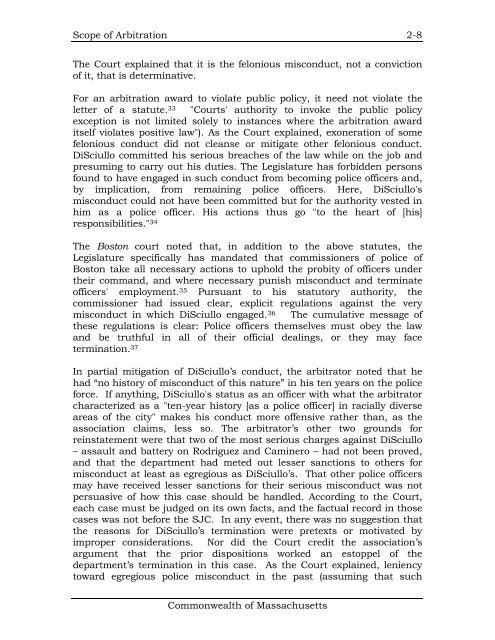Management Rights - AELE's Home Page
Management Rights - AELE's Home Page
Management Rights - AELE's Home Page
You also want an ePaper? Increase the reach of your titles
YUMPU automatically turns print PDFs into web optimized ePapers that Google loves.
Scope of Arbitration 2-8<br />
The Court explained that it is the felonious misconduct, not a conviction<br />
of it, that is determinative.<br />
For an arbitration award to violate public policy, it need not violate the<br />
letter of a statute. 33 "Courts' authority to invoke the public policy<br />
exception is not limited solely to instances where the arbitration award<br />
itself violates positive law"). As the Court explained, exoneration of some<br />
felonious conduct did not cleanse or mitigate other felonious conduct.<br />
DiSciullo committed his serious breaches of the law while on the job and<br />
presuming to carry out his duties. The Legislature has forbidden persons<br />
found to have engaged in such conduct from becoming police officers and,<br />
by implication, from remaining police officers. Here, DiSciullo's<br />
misconduct could not have been committed but for the authority vested in<br />
him as a police officer. His actions thus go "to the heart of [his]<br />
responsibilities." 34<br />
The Boston court noted that, in addition to the above statutes, the<br />
Legislature specifically has mandated that commissioners of police of<br />
Boston take all necessary actions to uphold the probity of officers under<br />
their command, and where necessary punish misconduct and terminate<br />
officers' employment. 35 Pursuant to his statutory authority, the<br />
commissioner had issued clear, explicit regulations against the very<br />
misconduct in which DiSciullo engaged. 36 The cumulative message of<br />
these regulations is clear: Police officers themselves must obey the law<br />
and be truthful in all of their official dealings, or they may face<br />
termination. 37<br />
In partial mitigation of DiSciulo’s conduct, the arbitrator noted that he<br />
had “no history of misconduct of this nature” in his ten years on the police<br />
force. If anything, DiSciullo's status as an officer with what the arbitrator<br />
characterized as a "ten-year history [as a police officer] in racially diverse<br />
areas of the city" makes his conduct more offensive rather than, as the<br />
association claims, less so. The arbitrator’s other two grounds for<br />
reinstatement were that two of the most serious charges against DiSciullo<br />
–assault and battery on Rodriguez and Caminero–had not been proved,<br />
and that the department had meted out lesser sanctions to others for<br />
misconduct at least as egregious as DiSciulo’s. That other police oficers<br />
may have received lesser sanctions for their serious misconduct was not<br />
persuasive of how this case should be handled. According to the Court,<br />
each case must be judged on its own facts, and the factual record in those<br />
cases was not before the SJC. In any event, there was no suggestion that<br />
the reasons for DiSciulo’s termination were pretexts or motivated by<br />
improper considerations. Nor did the Court credit the association’s<br />
argument that the prior dispositions worked an estoppel of the<br />
department’s termination in this case. As the Court explained, leniency<br />
toward egregious police misconduct in the past (assuming that such<br />
Commonwealth of Massachusetts
















